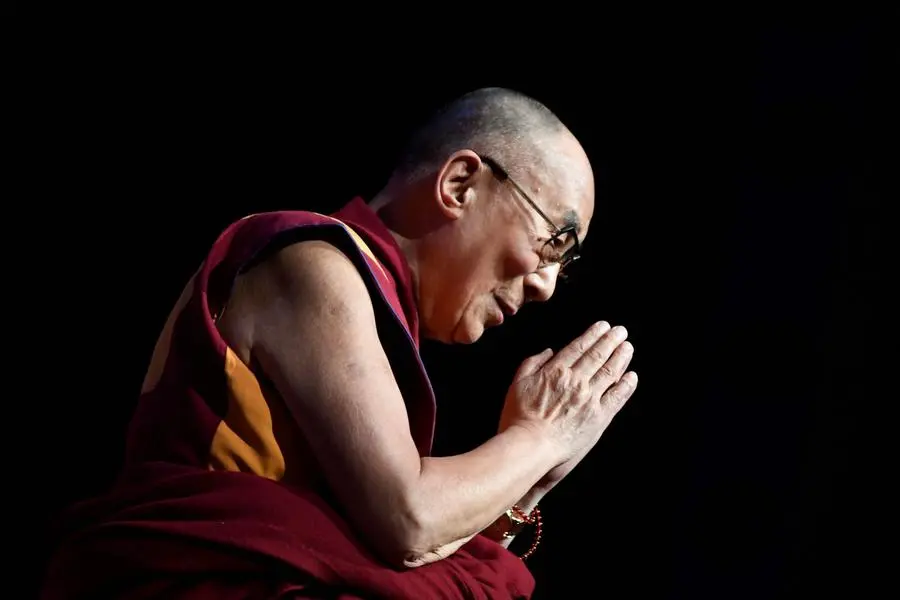PHOTO
The Dalai Lama, the charismatic Buddhist spiritual leader celebrated worldwide for his tireless campaign for greater autonomy for his Tibetan homeland, has been a thorn in China's side for decades.
Tenzin Gyatso, who describes himself as a "simple Buddhist monk", became the face of the Tibetan cause as he crisscrossed the globe, mixing with royalty, politicians and celebrities.
The 88-year-old, with his famous beaming smile, has become a global symbol of peace whose message transcends religion, regarded by his many supporters as a visionary in the vein of Mahatma Gandhi and Martin Luther King.
The Dalai Lama was just 23 when he fled the Tibetan capital Lhasa in fear for his life after Chinese troops crushed an uprising that began on March 10, 1959 -- 65 years ago this Sunday.
It took him 13 days to trek across the Himalayas to the Indian border. He has never returned.
His life in exile has centred around the northern Indian hill-town of Dharamsala, home to thousands of fellow Tibetans who maintain traditional customs, even though many have never set foot in their ancestral homeland.
In Dharamsala, he set up a government-in-exile and launched a campaign to reclaim Tibet, evolving to embrace a "middle way" -- relinquishing independence for greater autonomy.
- Unlikely celebrity -
In 1989 he won the Nobel Peace Prize for his bid to "seek reconciliation despite brutal violations".
The award catapulted him into the global spotlight, courted by world leaders and Hollywood stars.
In his maroon robes, simple sandals and wide-rimmed spectacles, the Dalai Lama made an unlikely celebrity.
But his sense of mischief -- he once announced he would like to reincarnate as an attractive blonde -- and infectious chuckle proved irresistible, and made him a darling of the world's media.
The Chinese government, however, has remained impervious to his charm, branding him a separatist and a "wolf in a monk's robe".
Tibet has alternated over the centuries between independence and control by China, and Beijing says the region is an integral part of the country.
The Dalai Lama wants greater autonomy for his people, including the right to worship freely and to preserve their culture, which many Tibetans say has been crushed under Chinese rule.
Formal negotiations with Beijing broke down in 2010.
A year later, the Dalai Lama retired from politics to make way for a new leader elected by exiled Tibetans around the world.
- Life of exile -
Born into a farming family in the Tibetan village of Taksar on July 6, 1935, he was chosen as the 14th incarnation of Tibetan Buddhism's supreme religious leader at the age of two.
He was given the name Jetsun Jamphel Ngawang Lobsang Yeshe Tenzin Gyatso -- Holy Lord, Gentle Glory, Compassionate Defender of the Faith and Ocean of Wisdom -- and taken to Lhasa's 1,000-room Potala Palace to be trained to become the leader of his people.
He indulged a precocious scientific curiosity, playing with a watch sent to him by US president Franklin Roosevelt and repairing cars, one of which he crashed into a palace gate.
But his childhood ended abruptly at age 15 when he was hastily enthroned as head of state after the Chinese army invaded Tibet in 1950.
Nine years later, as Chinese troops crushed a popular uprising, he escaped to India.
When told the Dalai Lama had fled, Chinese leader Mao Zedong reportedly said: "In that case, we have lost the battle."
He was welcomed by India's first prime minister, Jawaharlal Nehru, who offered Dharamsala as a base for him and thousands of fellow Tibetan refugees.
Throughout the Dalai Lama's life, he has been treated as an honoured guest in India -- an official policy stance that has been a source of tension with Beijing.
It is unclear how, or even whether, his successor will be named, with his predecessors chosen by monks according to ancient Buddhist traditions.
He has alternatively suggested the next Dalai Lama could be a girl, that his spirit could transfer to an adult successor, or that he could even be the last in the line -- and that he might be reincarnated as an animal or an insect instead.
But he has always been clear on one point -- that any successor named by China would not be credible.
"No recognition or acceptance should be given to a candidate chosen for political ends by anyone, including those in the People's Republic of China," he has said.





















